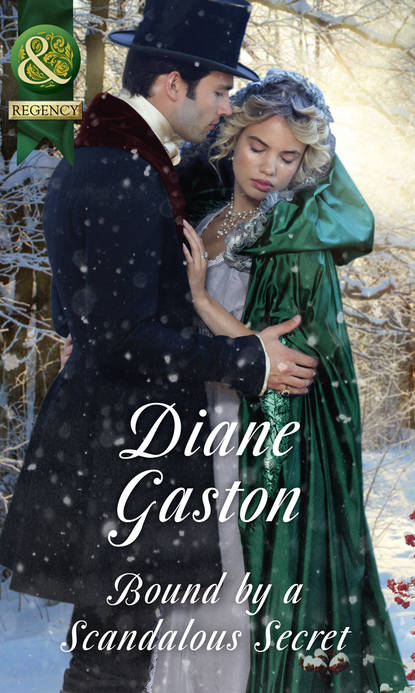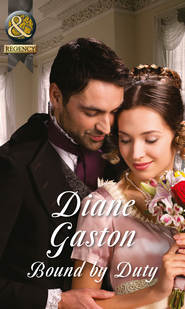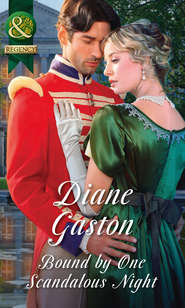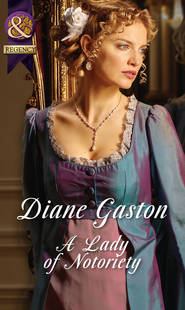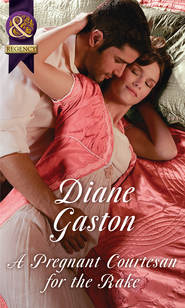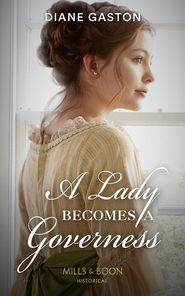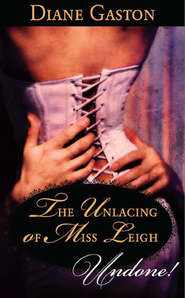По всем вопросам обращайтесь на: info@litportal.ru
(©) 2003-2024.
✖
Bound By A Scandalous Secret
Настройки чтения
Размер шрифта
Высота строк
Поля
She nodded, a nostalgic look on her face. ‘It was once one of our favourite places to play.’
‘You have two sisters. Am I correct?’
She swung her feet below the bench, much like she must have done when a girl. ‘And a half-brother.’ She slid him a glance. ‘My bastard brother, you know.’
Did she enjoy speaking aloud what others preferred to hide?
‘He was raised with you, I think?’ It was said Sir Hollis tried to flaunt his love child in front of his wife.
‘Yes. We all got on famously.’
She seemed to anticipate unspoken questions and answered them defiantly.
‘Where is your brother now?’ he asked.
‘Would you believe he is a sheep farmer in the Lake District?’ she scoffed.
‘Why would I not believe it?’ Almost everyone he knew could be considered a farmer when you got right down to it.
‘Well, if you knew him you’d be shocked that he wound up raising sheep. He was an officer in the Twenty-Eighth Regiment. He was wounded at Waterloo.’ She waved a hand. ‘Oh, I am making him sound too grand. He was a mere lieutenant, but he was wounded.’
‘He must have recovered?’ Or he would not be raising sheep.
‘Oh, yes.’
‘And your other sister?’ He might as well get the whole family story, since she seemed inclined to tell it.
‘Tess?’ She giggled but tried to stop herself.
‘What amuses you?’
‘Tess is married.’ She strained not to laugh. ‘But wait until I tell you how it was she came to be married! She and Marc Glenville were caught together in a storm. A rainstorm. Lord Tinmore forced them to marry.’
How ghastly. Nothing funny about a forced marriage. ‘I am somehow missing the joke.’
She rolled her eyes. ‘We are caught in a storm. You could be trapped into marrying me.’ She wagged a finger at him. ‘So you had better hope we are not discovered.’ Then an idea seemed to dawn on her face. ‘Unless you are already married. In that case, only I suffer the scandal.’ She made it sound as if suffering scandal was part of the joke.
‘I am not married.’
She grinned. ‘We had better hope Lord Tinmore or his minions do not come riding by, then.’
No one would find this place unless they already knew its location, even if they were foolish enough to venture out in a snowstorm. If they did find them, though, Ross had no worries about Lord Tinmore. Tinmore’s power would be a trifle compared to what Ross could bring to bear.
She took a breath and sighed and seemed to have conquered her fit of giggles.
‘I am acquainted with Glenville,’ he remarked. ‘A good man.’
‘Glenville is a good man,’ she agreed.
He could not speak of why he knew Glenville, though.
He’d sailed Glenville across the Channel in the family yacht several times during the war when Glenville pursued clandestine activities for the Crown. Braving the Channel’s waters was about the only danger Ross could allow himself during the war, even if he made himself available to sail whenever needed. This service had been meagre in his eyes, certainly a trifle compared to what his friend Dell had accomplished. And what others had suffered. He’d seen what the war cost some of the soldiers. Limbs. Eyes. Sanity. Why should those worthy men have had to pay the price rather than he?
He forced his mind away from painful thoughts. ‘I had not heard Glenville’s marriage had been forced.’
‘Had you not?’ She glanced at him in surprise. ‘Goodness. I thought everyone knew. I should say they seem very happy about it now, so it has all worked out. For the time being, that is.’
‘For the time being?’
She shrugged. ‘One never knows, does one?’
‘You sound a bit cynical.’ Indeed, she seemed to cycle emotions across her face with great rapidity.
Her expression sobered. ‘Of course I am cynical. Marriage can bring terrible unhappiness. My parents’ marriage certainly did.’
‘One out of many,’ he countered, although he knew several friends who were miserable and making their spouses even more so. His parents’ marriage had been happy—until his mother died. In his father’s present marriage happiness was not an issue. That marriage was a political partnership.
‘My sister Lorene’s marriage to Lord Tinmore is another example.’ She glanced away and lowered her voice as if speaking to herself and not to him. ‘She is wasting herself with him.’
‘Has it been so bad? She brought him out of his hermitage, they say. He’d been a recluse, they say.’
‘I am sure he thinks it a grand union.’ She huffed. ‘He now has people he can order about.’
‘You?’ Clearly she resented Tinmore. ‘Does he order you about?’
‘He tries. He thinks he can force me to—’ She stopped herself. ‘Never mind. My tongue runs away with me sometimes.’
She fell silent and stilled her legs and became lost in her own thoughts, which excluded him. He’d been enjoying their conversation. They’d been talking like equals, neither of them trying to impress or avoid.
He wanted more of it. ‘Tell me about your painting.’
She looked at him suspiciously. ‘What about it?’
‘I did not understand it.’
She sat up straighter. ‘You mean because the sky was purple and pink and the grassy hills, blue, and it looked nothing like December in Lincolnshire?’
‘Obviously you were not painting the landscape as it was today. You said you painted a memory, but surely you never saw the scene that way.’ The painting was a riot of colour, an exaggeration of reality.
She turned away. ‘It was a memory of those bright childhood days, when things could be what you imagined them to be, when you could create your own world in play and your world could be anything you wanted.’
‘The sky and the grass could be anything you wanted, as well. I quite comprehend.’ He smiled at her. ‘I once spent an entire summer as a virtuous knight. You should have seen all the dragons I slew and all the damsels in distress I rescued.’
Her blue eyes sparkled. ‘I was always Boadicea fighting the Romans.’ She stood and raised an arm. ‘“When the British Warrior queen, Bleeding from the Roman rods...”’ She sat down again. ‘I was much influenced by Cowper.’
‘My father had an old copy of Spencer’s The Faerie Queene.’ It had been over two hundred years old. ‘I read it over and over. I sought to recreate it in my imagination.’
She sighed. ‘Life seemed so simple then.’





